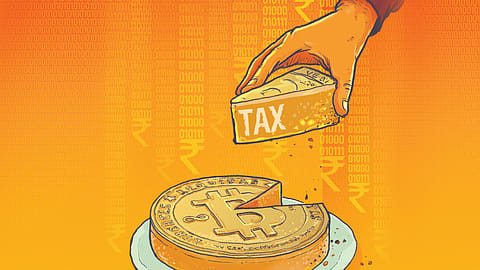Crypto TDS: Here's what govt guidelines say
The CBDT has issued an FAQ to clear confusion around TDS on virtual digital assets.

The Central Board of Direct Taxes (CBDT) has issued detailed guidelines for TDS deduction on virtual digital assets as the new Section 194S of the Income-tax Act, 1961 comes into effect on July 1, 2022.
From July 1, tax deducted at source (TDS) of 1% will be levied on payments towards virtual digital assets like crypto for transactions above ₹10,000 in a year, as per the new rules. The threshold limit for TDS would be ₹50,000 a year for specified persons, which include individuals/HUFs, who are required to get their accounts audited under the I-T Act.
The government had announced a 30% tax on crypto in the Union Budget 2022-23. It had also said that a 1% TDS will also be held back each time an investor sells a virtual digital asset over a certain threshold.
The new section mandates a person, who is responsible for paying to any resident any sum by way of consideration for transfer of a virtual digital asset (VDA), to deduct an amount equal to 1% of such sum as income tax. The tax deduction is required to be made at the time of credit of such sum to the account of the resident or at the time of payment, whichever is earlier, the guidelines say.
The CBDT issued an FAQ to clear confusion around the tax. Here's what it says:
Question: Who is required to deduct tax when the transfer of VDA is taking place on or through an exchange and payment is made by the purchaser to the exchange (directly or through broker) and then from the exchange it goes to the seller directly or through the broker?
Answer: According to section 194S of the Act, any person who is responsible for paying to any resident any sum by way of consideration for transfer of VDA is required to deduct tax. Thus, in a peer-to-peer (i.e. direct buyer to seller) transaction, the buyer (i.e person paying the consideration) is required to deduct tax under section 194S of the Act.
Recommended Stories
However, if the transaction is taking place on or through an exchange there is a possibility of tax deduction requirement under section 194S of the Act at multiple stages. Hence, in order to remove difficulties for transactions taking place on or through an exchange, the following clarifications are issued:
In a case where the transfer of VDA takes place on or through an exchange and the VDA being transferred is owned by a person other than the exchange: In this case the buyer would be crediting or making payment to the exchange (directly or through a broker). The exchange then would be required to credit or make payment to the owner of VDA being transferred, either directly or through a broker. Since there are multiple players, to remove difficulty it is clarified that:
1. Tax may be deducted under section 194S of the Act only by the exchange which is crediting or making payment to the seller (owner of the VDA being transferred). In a case where the broker owns the VDA, it is the broker who is the seller. Hence, the amount of consideration being credited or paid to the broker by the exchange is also subject to tax deduction under section 194S of the Act.
2. In a case where the credit/payment between exchange and the seller is through a broker (and the broker is not seller), the responsibility to deduct tax under section 194S of the Act shall be on both the exchange and the broker. However, if there is a written agreement between the exchange and the broker that the broker shall be deducting tax on such credit/payment, then the broker alone may deduct the tax under section 194S of the Act.
(INR CR)
In a case where the transfer of VDA takes place on or through an exchange and the VDA being transferred is owned by such exchange: In this case there are no multiple players. The buyer is required to deduct tax under section 194S of the Act. However, there may be a practical issue as the buyer may not know whether the VDA being transferred is owned by the exchange or not. Hence, there may be genuine doubt in the mind of the buyer with regard to its responsibility to deduct tax under section 194S of the Act. This difficulty would also be there if the buyer is buying VDA from an Exchange through a broker.
To remove this difficulty, the tax department clarified that while the primary responsibility to deduct tax under section 194S of the Act, in this case, remains with the buyer or his broker, as an alternative the exchange may enter into a written agreement with the buyer or his broker that in regard to all such transactions the exchange would be paying the tax on or before the due date for that quarter.